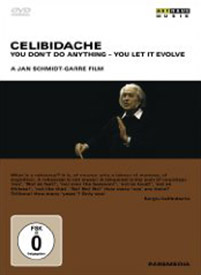« Je me suis détourné assez vite de l’idée de beauté « L’art est beau » Sans beauté, personne ne s’adonnerait à l’art mais la beauté n’est pas la finalité. C’est l’appât. Sans beauté, on ne comprendrait pas. Comme Schiller le disait déjà : « Celui qui a accédé à la beauté fera l’expérience qu’elle dissimule la vérité. Qu’est-ce que la vérité ? Impossible à définir précisément par la pensée mais à vivre. » Voilà des propos d’un homme intelligent, de goût et raffiné. Ce documentaire de Jan Schmidt-Garre est consacré au chef d’orchestre Celibidache, à la fois controversé et fort critique envers ses collègues. Il n’a pas peur de dire ce qu’il pense. Etrange destin que le sien. Il fait ses études de musique à Berlin, et devient en 1945 chef du célèbre Orchestre philharmonique de Berlin. À la mort de Wilhelm Furtwängler en 1954, l'orchestre choisit Herbert von Karajan ! Celibidache quitte la capitale allemande et entame une carrière de chef itinérant, ne se fixant jamais avec un orchestre, au Danemark, en Suède, en Amérique du Sud, en Italie, en France. De 1979 jusqu'à sa mort, il est le principal chef d'orchestre de l'Orchestre philharmonique de Munich et, à partir de 1983, il enseigne la phénoménologie de la musique au Curtis Institute à Philadelphie. Il appréciait la musique allemande, russe et française. Dans la musique allemande, il vouait un culte à la musique d'Anton Bruckner. Dans la musique française, il était un interprète de premier ordre de Claude Debussy et de Maurice Ravel. Son soliste préféré était le pianiste Arturo Benedetti Michelangeli. Il a pratiquement toujours refusé d'enregistrer, que ce soit en concert ou en studio, avec l'argument que le disque ne pouvait reproduire tous les épiphénomènes qui existaient dans la musique et que seul le concert en direct pouvait révéler. À la fin des années 1990, son fils Serge Ioan Celibidachi a autorisé Deutsche Grammophon à publier les enregistrements de Stuttgart (1971-1977) et EMI ceux de Munich (1979-1996) captés par la Radiodiffusion bavaroise. Comment donc la musique devient-elle musique ? Voilà tout l’art non seulement du compositeur mais du chef d’orchestre pour nous faire pénétrer dans le mystère de la beauté et de ce qu’elle transmet ! Entretiens, répétitions, séminaire etc., Célibidache est montré sous toutes les coutures, dissertant, parlant, philosophant, dirigeant. Ce chef d’orchestre qui n’a jamais enregistré un disque, qui pense que sur 100 concerts dans l’année deux ou trois seulement sont excellents, ne prend pas la musique à la légère mais tente de lui redonner toute son ampleur. C’est dire qu’il était exigeant. Alors il est temps de découvrir un chef d’orchestre fort curieux et passionnant avec sa gueule de lion et ses grands cheveux blancs. 110 minutes passionnantes en compagnie d’un homme spirituel et doté de pas mal d’humour.
Yannick Rolandeau
“I turned away fairy quickly from the idea of beauty. Art is beautiful. Without beauty, no one would give himself over to art, but beauty is not finality. It is a lure. Without beauty, we cannot understand. As Schiller already said: “He who has access to beauty will have the experience that it conceals the truth.” What is truth? It cannot exactly be defined by thinking, but must be lived.” Here are the words of an intelligent, refined man of taste. This documentary by Jan Schmidt-Garre is devoted to the conductor Celibidache, who was both controversial and highly criticized by his colleagues. He is not afraid to say what he thinks. What a strange destiny! He studied music in Berlin, and in 1945 became conductor at the famous Berlin Philharmonic Orchestra. Upon Wilhelm Furtwängler death in 1954, the orchestra chose Herbert von Karajan. Celibidache left the German capital and began a career as an itinerant conductor in Denmark, Sweden, South America, Italy and France, although never permanently heading an orchestra. From 1979 until his death, he was the principal head conductor of the Munich Philharmonic Orchestra, and starting from 1983, taught musical phenomenology at the Curtis Institute in Philadelphia. He highly valued German, Russian and French music. Insofar as German music, he worshiped the music of Anton Bruckner. In French music, he was a top interpreter of Claude Debussy and Maurice Ravel. His preferred soloist was the pianist Arturo Beneditti Michelangeli. He almost always refused to record, either in concert or studio, arguing that the disc could not reproduce all the epiphenomena that exist in music, which only a live concert could reveal. At the end of the 1990s, his son Serge Ioan Celibidachi authorized Deutsche Grammophon to issue the Stuttgart recordings (1971-1977) and EMI the Munich ones (1979-1996) recorded by the Radiodiffusion Bavaroise. How then does music become music? Here is all the art not only of the composer but of the conductor who allow us to penetrate the mystery of beauty and what it transmits! Interviews, rehearsals, seminars, etc., Celibicache is seen in all his splendor, expounding, talking, philosophizing, conducting. This conductor who never recorded a record, who thought that out of his hundred concerts a year only two or three were excellent, does not take music lightly, but rather tries to restore its full scope. That shows how demanding he was. So, it is now time to rediscover this highly curious and passionate conductor, with his lion’s mug and long white hair. One hundred ten passionate minutes in the company of a spiritual man, who also happens to be quite funny.
Translation Lawrence Schulman | Disponible sur |  |
|  |